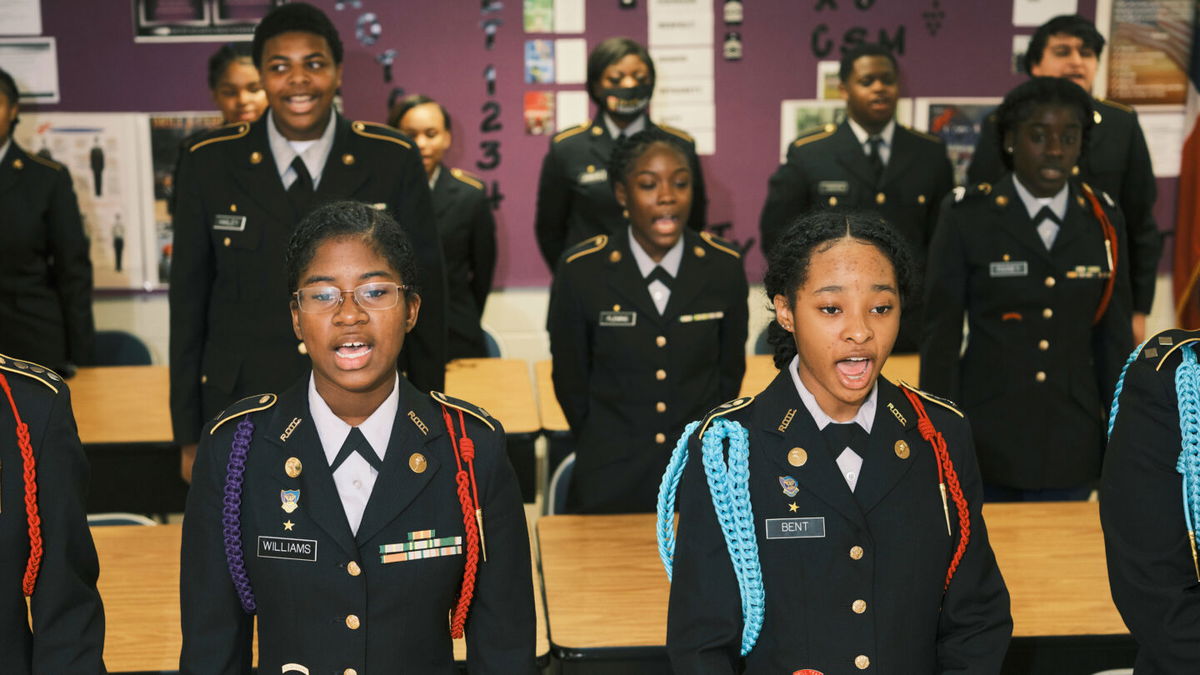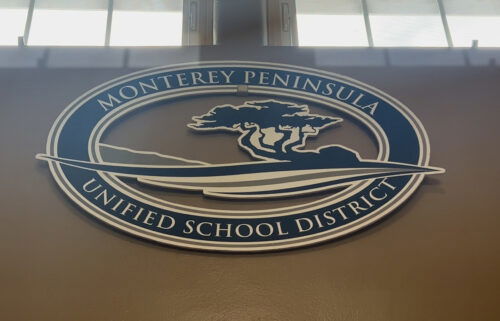Mandatory military instruction affects Black and Latino high school students most frequently, report says

Students in JROTC recite the Cadet Creed at South Atlanta High School in Atlanta
By Rikki Klaus, CNN
When high school student Trevor Reed was automatically enrolled in a Junior Reserve Officers’ Training Corps (JROTC) class in 2020, both he and his mother objected.
“We don’t have to look far outside of our family to see the effect that the military has, especially when you have to go off to war. And so that’s something my son never really wanted to do,” Tineeka Reed told CNN.
So, the Chicago mother sent multiple emails to the instructor of the Department of Defense-sponsored youth military program and the principal at Dr. Martin Luther King Jr. College Preparatory High School, offering an alternative. She suggested her son Trevor, 17, could enroll in an online class that would meet the required health credit. But the message Reed told CNN she heard from school administration was, “it’s either our way or the highway, or he don’t graduate.”
With his sights set on college, Reed said Trevor stayed in the class against his will.
Reed, a member of a Chicago Public Schools (CPS) Local School Council, which approves curriculum and budgets, started looking into the JROTC program’s reach in Chicago and discovered JROTC was being made mandatory beyond her son’s school. And there was a racial component.
A May 2022 CPS Inspector General’s report found schools with 90% or more freshmen enrolled in JROTC were almost all on the South or West sides of Chicago. CPS says it has vowed to adopt all recommendations coming out of the report and has created a universal participation consent form.
Yet, too many of the the most vulnerable kids in her community have already been exploited, Reed told CNN.
“What we noticed about the 12 schools that we researched is that not only were they Black and Brown, but these are some of the poorest neighborhoods in Chicago,” she said.
The Department of Defense told CNN: “The Department strongly maintains that participation in the JROTC program is a voluntary elective.”
A recent New York Times investigation found that requiring students to enroll in JROTC reaches far beyond Chicago, where CPS JROTC leaders proudly state they have “the largest JROTC program in the country in number of cadets and total programs.”
The Times’ extensive investigation found automatic enrollment into JROTC and at least 75% of participation by a single grade happening in dozens of schools in multiple states, affecting thousands of students.
The information The Times acquired from more than a couple hundred open records requests revealed the vast majority of schools affected are predominantly attended by students of color and kids who live in households with low incomes. Based on an analysis of Army data, The Times discovered at schools where at least 75% of freshmen attended JROTC classes, more than 80% of the schools had student populations with mostly Black or Latino kids.
In response to the Times’ findings, the DOD told CNN: “The Department works hard to advance racial equity and support underserved communities. JROTC programs are widely distributed throughout the nation.”
The DOD said more than 3,400 schools in all 50 states and four U.S. territories currently host a JROTC class. The department said it’s investing $425.4 million in the program this year alone.
Some schools cite funding as reason
As part of his work with Quaker organization American Friends Service Committee, Jesus Palafox Valdovinos was pulling data on JROTC enrollment practices in Chicago at the same time as Reed, the mother from Chicago.
The 33-year-old activist said as a student, he got a call to join JROTC at his Chicago high school, which he said military recruiters frequented.
“There were four recruiting stations within about a block and a half of the school. And so there was a heavy percent of military recruiters there. At the time, Curie High School was the most diverse school in the city. But predominantly, the student body was a student of color,” Palafox Valdovinos told CNN.
Some schools wholeheartedly opting at least one grade into JROTC point to funding issues. In Chicago, the CPS Inspector General found “principals’ reasons for 90+ percent freshman JROTC enrollment rates centered on two themes: Physical education and funding.” It said principals shared they either lost a PE teacher, couldn’t hire a new one or couldn’t afford one, so students were placed in JROTC as an accepted substitute to physical education, a class CPS requires to graduate.
The report said, “Some principals conceded that JROTC saved their school money” since CPS and the DOD share the cost of JROTC instructors, while PE teachers’ salaries come out of school budgets.
Parent questions school policy
In Fort Myers, Florida, Julio Mejia believes schools should invest in at least one option outside of JROTC. He says he saw a red flag in 2019, when his daughter brought home a waiver, saying if she were hurt in the JROTC class she never signed up for, the Army and Fort Myers High School were not liable.
“I shouldn’t have to sign an injury waiver for school, for my kid to graduate from high school. That’s insane.”
Mejia says he fought her enrollment into the program, but the school administration insisted the class was required for graduation.
“I think it’s just ridiculous that the military has an all-volunteer army but we’re going to force high school kids to take military classes. It makes no sense,” Mejia told CNN, calling it “indoctrination.” “What country makes kids take military classes in order to graduate from high school?”
The appeal of the military
Adalberto Aguirre, chair and professor of sociology at University of California Riverside, sees the program as a way to recruit service members, following the end of the draft in the 1970s. He said young minorities have long been presented with the military path as a way to improve quality of life.
“It’s attractive because of the high poverty rates that they have to deal with, limited educational pathways. You have somebody that comes and says, sign up…come join us,” Aguirre told CNN.
And not all students and parents are critical of the JROTC.
In Pike County, Alabama, where the most recent Census data show more than half of residents are White, Jeremy Knox, the career and technical education director for Pike County Schools, told CNN all ninth graders at the county’s two high schools are automatically enrolled in JROTC, in addition to English, math, science and history classes. Knox says it has nothing to do with race, for the more than 230 freshmen participating in activities including marksmanship, cyber orienteering, archery, drill and ceremony.
“The leadership skills that they gain and citizenship skills that they gain are second to none,” Knox said.”There’s a place for everybody in it. So it allows a student to come in that may not have the best study habits or may not have the best social skills or may not know maybe what they want. And it gives them the structured environment to better themselves in their areas.”
Knox recalls one student who opted out of the program for religious reasons — but says the community wholeheartedly embraces the widespread freshmen participation. He noted it’s been so successful in Pike County, the DOD awarded a grant for a JROTC STEM camp.
The DOD says since JROTC formed in 1916, the program has taught kids valuable lessons. “JROTC instills in students the values of citizenship, service to the United States (including an introduction to service opportunities in military, national, and public service), and personal responsibility and a sense of accomplishment,” the department told CNN.
But back in Chicago, Reed says her son Trevor bristled when recruiters showed up at her house, trying to convince him to join the armed services. She said he’s now a sophomore attending community college, studying computer science.
“Parents should definitely be more aware of the positions that they can hold in their child’s educational career. And their socioeconomic status and where you live at shouldn’t be what type of education your child receives,” she said.
The-CNN-Wire
™ & © 2022 Cable News Network, Inc., a Warner Bros. Discovery Company. All rights reserved.


